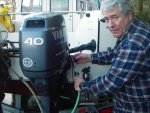alanc
New member
- Joined
- Jul 23, 2011
- Messages
- 77
- Reaction score
- 0
- C Dory Year
- 2004
- C Dory Model
- 22 Cruiser
The sticker on the cowling clearly states:
"Flush with fresh water after each use" .
For the folks that keep thier boats in the salty sea, do ALL of you follow this advise, and if so ( or not) what have been your corrosion issues over say, the past 4 years?
I mean, if the lable is right on the engine, and I am too lazy to follow the instruction, am I not asking for premature corrosion and other issues?. Or do saline folks just not like Hondas. The plan for us to to baby the sucker for a season or so, and see how far we get. Anything remotley resembling repowering is not in the plan in the forseeable few seasons.
My 40 HP twp cycle Mariner was in all salt water all season, every season for 10 years. Routine annual service and winterisation done every year (No NOT a daily flush) and we NEVER missed a day on the water due to mechanical falure....OH, yeah...we would replace the impeller very other season. whether it showed signs of wear or not.
Looking forward to opinions, love letters, advise and admonitions.
"Flush with fresh water after each use" .
For the folks that keep thier boats in the salty sea, do ALL of you follow this advise, and if so ( or not) what have been your corrosion issues over say, the past 4 years?
I mean, if the lable is right on the engine, and I am too lazy to follow the instruction, am I not asking for premature corrosion and other issues?. Or do saline folks just not like Hondas. The plan for us to to baby the sucker for a season or so, and see how far we get. Anything remotley resembling repowering is not in the plan in the forseeable few seasons.
My 40 HP twp cycle Mariner was in all salt water all season, every season for 10 years. Routine annual service and winterisation done every year (No NOT a daily flush) and we NEVER missed a day on the water due to mechanical falure....OH, yeah...we would replace the impeller very other season. whether it showed signs of wear or not.
Looking forward to opinions, love letters, advise and admonitions.

